Feeding the older horse
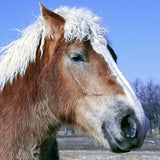 If you are looking after an aged horse (20 years+) then his dietary needs are going to change as he gets older. Here are some elements to consider when planning the diet for your senior, to help keep him healthy and happy during his ‘Golden Years’.
If you are looking after an aged horse (20 years+) then his dietary needs are going to change as he gets older. Here are some elements to consider when planning the diet for your senior, to help keep him healthy and happy during his ‘Golden Years’.
DENTAL
Digestion begins with being able to adequately chew and break down fibrous feed stuffs (pasture and hay), but as our seniors have less tooth length left this becomes a problem and makes it difficult, and often painful, to physically chew enough food to meet their maintenance level needs. This inability to chew properly increases the risk of choke and large colon impactions in seniors as food is not ground down sufficiently at the very start of the digestive process. Fresh pasture is often easier to manage than hay due to its higher moisture content. 'Softer' hays that are easier to chew would include early cut meadow grass and those with a higher legume content, such as lucerne and clover. For older horses that are struggling on 'soft' hay, fibrous feeds such as chaff and hay pellets, which have already been chopped in the production process, can be soaked to soften them up further. Finally if your senior is really struggling to chew, high fibre products such as beet and soy pulp can be mixed into a watery porridge.
LOSS OF APPETITE
Dental pain leads to a reluctance to eat for any length of time, but many older horses do generally seem to have less interest in food. Reduce competition from younger horses so that your senior is not being driven off his dinner and perhaps give him somewhere where he can eat quietly in his own time. Separating his daily ration into a number of smaller feeds can help ensure he eats it all, and an appetite stimulant, such as apple cider vinegar which has numerous other health benefits, can be very useful. If your senior is a recent addition you may need to gradually experiment with different feeds to find one that he really likes.
FLUID INTAKE
Water is the most important nutrient for all horses, and it is important that older horses continue to drink adequately. Adding salt to meals can help encourage fluid uptake, and always ensure clean fresh water is available. Some horses do not like drinking water that is too cold, so bear that in mind in the winter. Dental pain can also be aggravated by cold water.
REDUCED DIGESTIVE EFFICIENCY
As if sore teeth and a poor appetite weren't enough to contend with, the food that is consumed is less likely to be digested as efficiently in the senior horse. As the digestive tract ages it gradually becomes less able to extract nutrients from feed. Many essential dietary elements such as protein, phosphorous and several vitamins are not absorbed as well and pass through. Older horses may also suffer from hypochlorhydria, underproduction of stomach acid, which can cause the incomplete digestion of protein, and a failure of mineral supplements to dissolve properly. If this is suspected try adding 240ml of vinegar to meals, particularly if supplementing minerals and amino acids.
Lower down the digestive system complex plant carbohydrate is broken down into energy by microorganisms in the large bowel. In the older horse the number and variety of these organisms is much lower. One answer is to try and restore colony numbers by supplementing with a probiotic (preferably lactobaccillus strains), with a minimum effective maintenance dose being estimated at 10 billion CFU (colony forming units). Providing an easily fermentable fibre source such as sugar beet pulp helps as a prebiotic food for these organisms.
REDUCED IMMUNE FUNCTION
Aged animals have increased susceptibility to infectious diseases with a prolonged recovery rate. Chronic inflammation is increasingly being accepted as a major underlying condition of many age related diseases such as arthritis, metabolic syndrome and vascular diseases. To help ensure your senior has good health in his golden years it is important to help support the immune system by ensuring his ration has adequate levels of the minerals that are needed to make the enzymes that are part of the immune response. These include copper, zinc and selenium.
MUSCLE LOSS
Aging is associated with a progressive loss of muscle mass, sarcopenia, with a strong link between oxidative stress (free radical damage) and muscle loss in older animals. Older horses are responsive to antioxidant supplementation, so if muscle loss is a problem, supplementing 5000-10,000IU of Vitamin E can be helpful.
Also consider supplementing the amino acid Lysine, the most important amino acid in protein assembly, at a rate of 10g per day, with vinegar to aid breakdown in the stomach.
|
RELATED PRODUCTS |
|||
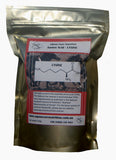 |
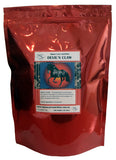 |
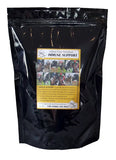 |
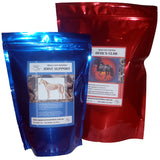 |
| Lysine | Devil's Claw |
Immune Support |
Joint Relief |